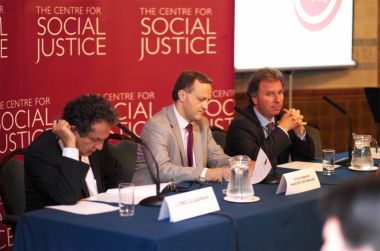How do we tackle poverty? Let CSJ count the ways...

The Centre for Social Justice (CSJ) has outlined 192 policy suggestions to combat what it defines as the 'five paths to poverty' in a new report entitled Breakthrough Britain 2015.
The policy suggestions include an alcohol treatment tax to finance residential rehabilitation for addicts, and setting up local family hubs to support families.
To combat educational failure they argue for incentives encouraging the best teachers and head teachers to move to work in the toughest communities and boarding school places for disadvantaged children.
Director of policy at the CSJ, Alex Burghart said: "We believe that there are solutions to these problems. [...] No one should accept that poverty and disadvantage is inevitable."
The think tank founded by the Secretary of State for Work and Pensions Iain Duncan-Smith, has held 150 evidence hearings, visited 1,000 charities and projects, met with 2,000 specialists, and polled 6,000 people to compile the report.
In 2007, the CSJ launched its first Breakthrough Britain, commissioned by David Cameron in 2005 shortly after he became Conservative Party Leader. The report described five interconnected paths to poverty which are: family breakdown, educational failure, worklessness, addiction, and serious personal debt.
Since then, the economic climate has changed dramatically. Recession has been, and partially gone, but many are still feeling the effects. This second report is launched in advance of next year's election as a challenge to the next government.
Recognising the evidence-based research, Conservative MP Oliver Letwin praised the report for being "true to life".
In attempting to address these problems Letwin said we should recognise that "These problems, while they are fantastically difficult for the families involved, are not insoluble. There is, if we are honest, [...] a tendency to think from time to time that there is some group of people somewhere that is un-rescuable. Rescue is a difficult thing to do, but it is do-able."
Liberal Democrat MP Steve Webb also welcomed the report, saying: "I welcome that from its inception the CSJ has been about causes [of poverty]." He added that a fair society should be one where "What's on your birth certificate doesn't affect your outcomes".
In tackling poverty in Britain, Labour peer and political thinker Lord Glasman emphasised the importance of relationships in building resilience to poverty. "A flourishing life is one embedded in relationships," he said.
Glasman believes we should find ways to 'incentivise virtue' in society – essentially making good works pay.
In a recent interview with the Catholic Herald, he explained what this principle could look like: "I'd like to see us redistribute resources to people who care – for each other, for children – so that couples can have a night out on a little date. I would have a weekend away for five years of marriage. A week's holiday for ten years of marriage. Maybe a cruise for twenty five years. Just a present, an acknowledgement that this is not easy – to stay together, to care for others, to be faithful and to forgive and rebuild. The whole direction of society is to reward freedom and so some generosity for people who make it work and do their duty – that's what I mean when I say 'rewarding virtue'".
Alongside Glasman's unusual approach, Letwin and Webb agreed that building strong relationships within families and communities is fundamental to tackling poverty in Britain. But identifying the best institutions to provide that support remains the challenge.
In this and other areas there is a latent call to the Church and other faith communities to be part of the glue holding an increasingly fragmented society together.
But clearly the Church isn't there yet. Glasman questioned where the Church had been for the 1,400 abuse victims in Rotherham, who were clearly "lacking the relationships to care and protect them".
These myriad policy suggestions are directed at the government, but the problems it identifies are the daily concern of charities and civil society institutions. Burghart called on both government and civil society to work together to build "the society of the second chance".











